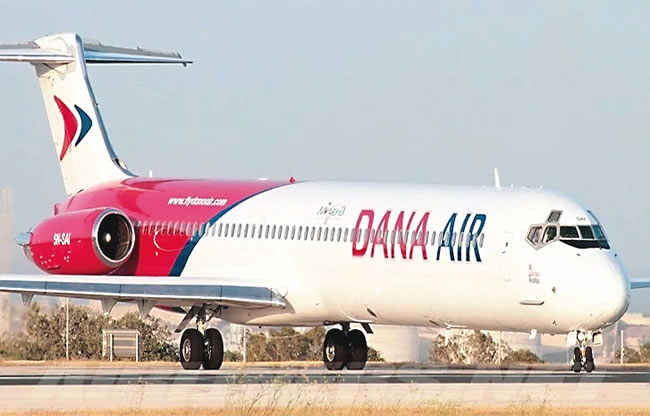There is an air of apprehension sweeping across the country’s aviation sector as two big domestic airlines have directly or indirectly stepped aside following the raging crisis challenging the airline business.
Before now, the airlines under their umbrella body, Airline Operators of Nigeria (AON) had consistently cried out over the poor business environment taking its toll on their operations, with particular mention of the exorbitant price of aviation fuel, the unavailability of foreign exchange, to the recent shutdown of the Runway 18Left and many other reasons.
According to the airlines, as of February this year, a liter of aviation fuel was sold for N200 which has within the last week increased two times to between N780 and N830. As the price of the commodity continues to increase daily, the inability of the airlines to access the forex market has further complicated issues for them since most of their transactions are done in foreign currencies.
The climax of the hardship reared its head early in the week with the announcement by the oldest of the domestic airlines, Aero Contractors, that it was temporarily closing down its scheduled operations, meaning that till God knows, it will not be involved in providing services to the traveling public.
Aero management had attributed its decision to what it described as challenging operating environment.
“The past few months has been very challenging for the Aviation industry and the airline operators in particular following the high cost of maintenance, skyrocketing fuel prices, inflation, and forex scarcity resulting in high foreign exchange rates which are amongst the major components of airline operations,” the airline declared.
While many key players have described the suspension of the scheduled flight operations by Aero as dangerous for a sector that is yet to meet the traveling demands of Nigerians who have now embraced air travels as an option to other mode of transports like road and rail due to insecurity challenges, they have raised the alarm on the negative impact the situation will have on the sector.
As the dust was yet to settle, there came another shocker still within the same week over the indefinite suspension of another strong carrier, Dana Air, by the Nigerian Civil Aviation Authority (NCAA) for reasons ranging from unhealthy financial books discovered during an audit conducted on the airline to the findings of an investigation conducted on the airline’s flight operations which revealed that “Dana Airlines was no longer in a position to meet its financial obligations and to conduct safe flight operations”.
Besides, the airline, before its final suspension, had lost some of its workers including its erstwhile deputy chief executive officer, Mr Sukhjinder Paul Mann and some pilots who resigned owing to the inability of the airline to pay their salaries.
The two airlines that are already down have traced their woes to similar reasons the other airlines have been shouting about and urging the federal government to urgently address.
Just like Aero, while Dana Air pledged to submit itself to the economic audit of the NCAA, the airline management listed the recent skyrocketing cost of Jet A1 at N830 per liter, unavailability of forex and inflation as contributory factors to its challenging predicaments craving the understanding and patience of customers, travel and business partners.
Many key players have described the situation as a bad omen and sign of worse things to come for the traveling public. They blamed the government for failing to act promptly to intervene in the plights of the operators.
In his reactions, an aviation security expert and a one time Commandant of the Murtala Muhammed Airport, Group Captain John Ojikutu, retired, declared: “Aero Contractors is out of commercial flight operations so also is Dana Air and I know for sure that Arik is getting choked; these are among the big ones; what do you think is happening to the lesser ones especially the new comers? I saw this coming in 2020 when COVID-19 got into the flight operations; go to cargo operations was what I advised our domestic airlines but it fell into deaf ears,. but here we are today.”
Speaking on the reason given by the NCAA for grounding Dana Air, Ojikutu, while welcoming the development added: “This is the first time I am hearing of the report of an economic audit of a Nigeria domestic airline. We need more of this on all the operators and not only on the airlines to effectively be complying with the Nigeria Civil Aviation Regulations (CARs) Part 18.17.1.1 on operations. I am hoping that these audits will be extended to other operators, especially service providers like FAAN, NAMA and Met. That is what the Nig CARs demands of the NCAA annually and not knee-jerk operation.”
According to a former airline chief who does not want to be quoted, the crisis rocking the airlines should be blamed on the government’s failure to recognise the national services the operators are carrying out on behalf of the government.
“This is a government which, for seven years, has failed to fulfill its promise of floating a national carrier for its citizens and yet cannot make the environment conducive for private investors who, out of patriotism, still choose to invest their resources in air transport despite the unfriendly environment,” he said.
The airline chief, who could not hide his anger over what he called the failure of the government to address the lingering unavailability of foreign exchange and the daily increase of aviation fuel, declared that Nigerians should hold the government responsible for any accident that may emanate from any compromise on the part of the troubled airlines that may want to remain in business at all costs.
Another airline chief, while commenting on the precarious situation facing the local airlines, had predicted that more airlines may also suspend operations due to the closure of the domestic airport runway in Lagos for maintenance as he said most airlines could not afford the daily wastages of taxing and holding for three months.
His words: “In three months, some airlines may ground themselves because Lagos is the hub for Nigeria operations”.
Speaking to Saturday Tribune, a regular traveler on the Lagos/Abuja route, Mr Yemi Martins, expressed worry over what he called the tough economic environment which he said might take Nigeria back to the era where some airlines were cutting corners leading to series of accidents.
He described the lack of concern shown by the government on addressing the challenges of unavailable forex that will enable the airlines maintain their aircraft and tackle other problems as an invitation to disasters.
To many stakeholders in the sector, there is no way the airlines can survive for a long time in the face of the constant rise in the price of Jet A1, foreign exchange challenge and other crises confronting the domestic airlines.
Losers
According to the key players, amidst the crisis, the major losers are the passengers who may be forced to pay more on the domestic routes as the few remaining airlines, out of their zeal to survive and reduce the effects of the listed challenges on their operations, will definitely increase fares just like their foreign counterparts.
The airlines had unanimously increased fares not quite long ago with a one-hour flight that used to sell for between N20,000 and N25,000, depending on the booking system and the aircraft type, jacked up to between N50,000 and N100,000 and more.
Backing the airlines to adjust their fares to remain in business, an aviation expert who recently spoke at a forum declared: “Sell what you buy. This is my candid opinion to airlines, given these uncontrollable factors of production in the airline industry. Demand will definitely drop but much better than cutting corners. If a trip fuel is 4,000 liters for one hour on jet (LOS ABV) for example at N800 per liter which gives N3,200,000 and a load factor of 100 passengers, This means fuel cost per passenger is N32.000 and this is approximately 30% of total cost. This will translate to N107,000 tariff for one way journey period.”
Still justifying why the airlines should adjust fares, the key player cited how PHCN has introduced ‘Premium Tariff’ on power and those who can afford it are settling for it.
“This is not the time for frivolous and reckless competition nor uneconomic patriotism. Operators should intensify cooperation, collaboration, consolidation, pruning schedules to minimise perishable seats and maximise load factor. The spirit of Spring Alliance must be strengthened. The sector must not negotiate an accident. NCAA is encouraged to be more vigilant to watch cutting corners.
Speaking to Saturday Tribune, the spokesperson for the NCAA said there was no cause for alarm, declaring that NCAA was basically created to handle this type of situation.
He said: “We exist to ensure everybody does what should be done. We monitor more than ever before now to avoid no safety compromise. Air travel involves lives and there is no parking space in the air. That is what the NCAA is created for.”






